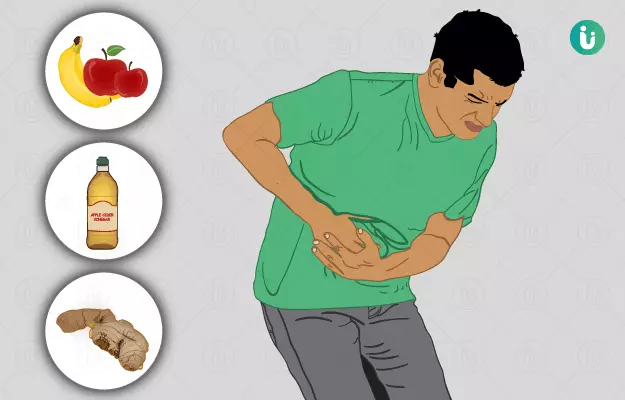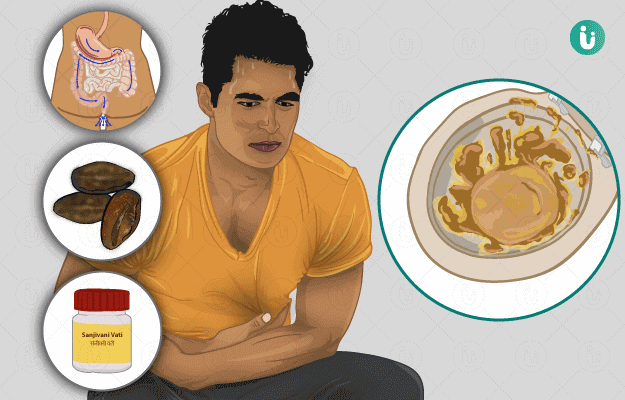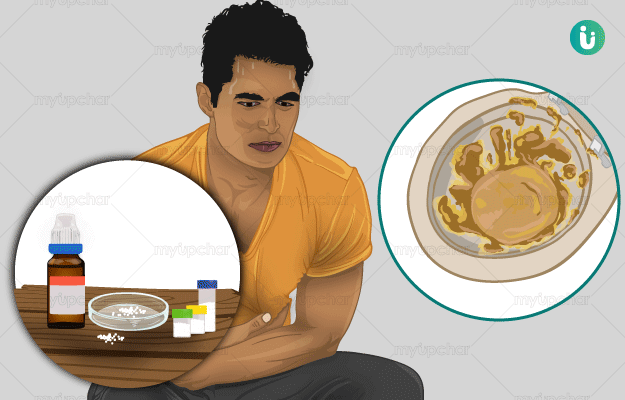Diarrhoea is the condition in which a person has loose watery bowel movements at least three times a day. The condition can last from a few days to weeks depending upon the type of infection. It may or may not be accompanied by abdominal bloating, gas or flatulence. Fluid loss caused due to diarrhoea can often lead to dehydration.
With time, diarrhoea can often become more severe and lead to other conditions such as a decreased responsiveness, urination, heart rate, and loss of skin colour. Diarrhoea can affect people of all age groups. It is one of the main causes of death and disease, especially among young children in low-income countries, according to the World Health Organization.
(Read more: Ayurvedic treatment for diarrhoea)
Why do you get diarrhoea?
Diarrhoea can be caused due to a wide variety of reasons which have been mentioned below. It, however, is mostly caused due to the ingestion of contaminated water.
- The main causal organisms of diarrhoea include bacteria, virus, or a parasite.
- The types of virus that cause diarrhoea include Rotavirus, Adenovirus, and Norovirus.
- Bacterial infections cause a more serious type of diarrhoea. The bacteria causing diarrhoea include Shigella, Campylobacter, Escherichia coli, Yersinia, Listeria and Salmonella.
- The main parasites responsible for causing diarrhoea include Entamoeba histolytica, Giardia lamblia, and Cryptosporidium. Read more: Parasitic infection
- Certain other diseases of the intestine such as irritable bowel syndrome, celiac disease and microscopic colitis can also cause diarrhoea.
- Reactions to certain medications used for gout, blood pressure, cancer and even antibiotics.
- Certain allergies such as lactose intolerance can cause diarrhoea as well.
- Alcohol abuse, ie overconsumption of alcohol can also be a cause for diarrhoea.
- Some types of cancer such as lymphoma, pancreatic cancer, and colon cancer could cause diarrhoea as well.
Signs you have diarrhoea
Home remedies for diarrhoea
Some home remedies for diarrhoea or ‘loose motion’ as it is commonly known that can be used to treat mild to moderate symptoms have been discussed in detail below.
Ginger for loose motion
Ginger is a natural remedy commonly used for an upset stomach and indigestion. The bioactive compounds present in ginger called gingerols and shogaols can help enhance stomach contractions. This aids in the rapid movement of food through the gut that was otherwise causing indigestion. The compounds present in ginger may also help to reduce nausea and vomiting.
People suffering from diarrhoea can add ginger to their food or try putting it in their tea. Certain all-natural ginger ales also contain enough ginger that can help soothe an upset stomach.
Mint to treat diarrhoea
Mint or Mentha longifolia leaves are used in herbal recipes, which are used for gastrointestinal disorders. This herb also has extensive use in traditional Iranian medicine for the treatment of indigestion, gas and diarrhoea. Studies have found that the essential oil constituents of mint such as the pulegone, cineol, and isomenthone are mainly responsible for its anti-diarrhoeal activity.
Mint leaves can be consumed either raw or cooked. You can prepare a smoothie with mint leaves for consumption. Traditionally, people boil mint leaves with cardamom to make tea. It is also possible to powder mint leaves and mix them with other beverages, teas, or foods.
Cinnamon for treating diarrhoea
Cinnamon is yet another effective home remedy when it comes to treating diarrhoea. This spice contains several antioxidants that can help in the process of digestion and decrease the risk of irritation or damage in the digestive tract. The most commonly found antioxidants in cinnamon are eugenol, cinnamaldehyde, linalool, and camphor. These compounds may help to reduce gas, bloating, cramping, and belching. They also help to neutralize the acidity in the stomach acidity to reduce indigestion and heartburn.
For treating diarrhoea, add 1 tsp of cinnamon powder, or a cinnamon stick, to your meals. Alternatively, you can try mixing the cinnamon with boiling water to make cinnamon tea. Take this tea two or three times a day to manage diarrhoea symptoms.
Cumin for loose motion
Cumin seeds, commonly known as jeera, contain bioactive compounds like tannins, alkaloids, glycosides, sugars, terpenes and flavonoids, which help to reduce indigestion and excess stomach acids, decreasing gas. Cumin is also an anti-microbial and helps to reduce inflammation caused by infection. Clinical trials have shown that cumin is able to reduce painful defecation in patients with irritable bowel syndrome.
For best results, mix 1 or 2 teaspoon(s) of ground or powdered cumin into your meals. Alternatively, you could also drink cumin tea prepared by adding a few teaspoons of cumin seeds or powder to boiling water.
Coconut water for diarrhoea
Coconut water is one of the most common remedies that are used for the management of gut issues including diarrhoea. Diarrhoea causes dehydration, which can be treated by intake of coconut water. It is a rich source of minerals and electrolytes that replenish body fluids. Coconut water also enhances blood circulation and helps in recovering from diarrhoea quickly. A glass of coconut water twice a day is recommended for best results.
Pumpkin to relieve loose motion
Pumpkin, especially pumpkin seeds and leaves can also be used to relieve diarrhoea symptoms. Pumpkin leaves and seeds have a strong anti-parasitic activity and are hence effective against diarrhoea caused by parasitic infections.
Also, the soluble fibres present in pumpkin helps in retaining water from and hardening the stool. Pumpkin also has high levels of potassium and its consumption replenishes the body fluids with electrolytes.
You can consume about a cup of boiled or baked pumpkins. The juice prepared from raw pumpkin leaves or from the crushed seeds can also be consumed for better results.
Basil leaves to manage loose motion
Basil contains several bioactive compounds like cineole, camphor and thymol that increase appetite, relieve cramping, reduce gas and improve overall digestion. Basil also contains eugenol, which acts to neutralise stomach acidity. The linolenic acid content in basil has anti-inflammatory properties. Thus, basil is an effective remedy for diarrhoea.
You can add 1 or 2 teaspoon(s) of dried basil leaves, or a couple of fresh basil leaves, to meals until the symptoms of diarrhoea lessen. For more immediate results, you can mix half a teaspoon of dried basil, or a few fresh leaves, with boiled water and prepare tea.
(Read more: How to improve digestion)
Licorice for diarrhoea
Licorice or liquorice is the root of Glycyrrhiza glabra that is traditionally used as a home remedy for diarrhoea. Licorice is especially effective against rotavirus, one of the leading pathogens that cause severe gastroenteritis and represents a serious threat to human health.
The bioactive constitute of licorice root are saponins, flavonoids, isoflavones, coumarins, stilbenoids. These compounds exert many useful pharmacological properties that include anti-viral and anti-bacterial activities. Studies have found that the use of licorice can help relieve diarrhoea and reduce the inflammation caused due to intestinal conditions as gastroenteritis.
The roots can be crushed to make a powder which can then be added to boiling water to prepare licorice tea for consumption.
Oral rehydration system/therapy to treat diarrhoea
ORS or ORT is a fluid replacement therapy used to prevent and treat dehydration, especially caused by diarrhoea. The therapy involves drinking water with certain amounts of sugar and salts, especially, sodium, potassium and zinc. Zinc supplementation during acute diarrhoea is currently recommended by the World Health Organization (WHO) and the United Nations Children's Fund (UNICEF).
ORS is available in a packeted form in the markets. For effective results, the entire contents of a 100 g packet are dissolved in a litre of water and then consumed in smaller quantities till the symptoms lessen.
(Read more: Fluid therapy)
Yoghurt for loose motions
Yoghurt is one of the best foods that you can consume when you have loose motions. It is a probiotic, that is, it contains good bacteria that naturally soothe the stomach and help maintain digestive health. The lactic acid in yoghurt destroys the bad bacteria in your intestines and helps regulate stool consistency.
To reap its benefits, you can add banana or isabgol (psyllium husk) to half a bowl of yoghurt and have it thrice a day.
Orange tea for managing diarrhoea
Orange tea prepared from orange peels is an effective remedy to manage diarrhoea symptoms. Drinking this tea will keep you hydrated thus preventing dehydration that may be caused due to diarrhoea.
Also, orange peel is rich in pectin, which is a type of carbohydrate that increases the proportion of beneficial bacteria in your large intestine. These beneficial bacteria, in turn, promote gut health.
To prepare orange tea, throw a handful of orange peels into boiling water. Strain the water, allow it to cool and drink it with lemon and honey.
(Read more: Benefits and side effects of oranges)
When to see a doctor for diarrhoea
An upset stomach, indigestion or a mild diarrhoea is not usually a cause of concern. In most cases, symptoms typically reduce within a few hours of taking remedies. Older individuals and children, however, can become dehydrated much faster, and should seek medical attention for vomiting and diarrhoea that lasts for more than a day. Also, people with severe, frequent, or persistent stomach problems should consult a doctor. In case of persisting diarrhoea or the following symptoms mentioned below, it is necessary to seek medical attention.
- continual or uncontrollable vomiting or diarrhoea
- chronic constipation
- fever
- bloody stool or blood in vomit
- inability to pass gas
- dizziness or lightheadedness
- unintentional weight loss
- a lump in the abdomen or stomach
- difficulty swallowing
- history of iron-deficiency anaemia or associated conditions
- pain when urinating
References
- Maciej Grzybek et al. Evaluation of Anthelmintic Activity and Composition of Pumpkin (Cucurbita pepo L.) Seed Extracts—In Vitro and in Vivo Studies . Int J Mol Sci. 2016 Sep; 17(9): 1456. PMID: 27598135
- Himanshu Bhusan Sahoo et al. Anti-diarrhoeal investigation from aqueous extract of Cuminum cyminum Linn. Seed in Albino rats . Pharmacognosy Res. 2014 Jul-Sep; 6(3): 204–209. PMID: 25002800
- Shahram Agah, Amir Mehdi Taleb, Reyhane Moeini, Narjes Gorji, Hajar Nikbakht. Cumin Extract for Symptom Control in Patients with Irritable Bowel Syndrome: A Case Series . Middle East J Dig Dis. 2013 Oct; 5(4): 217–222. PMID: 24829694
- Collise Njume et al. Treatment of Diarrhoea in Rural African Communities: An Overview of Measures to Maximise the Medicinal Potentials of Indigenous Plants . Int J Environ Res Public Health. 2012 Nov; 9(11): 3911–3933. PMID: 23202823
- Ghader Jalilzadeh-Amin, Massoud Maham. Antidiarrheal activity and acute oral toxicity of Mentha longifolia L. essential oil . Avicenna J Phytomed. 2015 Mar-Apr; 5(2): 128–137. PMID: 25949954
- Humphrey Wanzira, Marzia Lazzerini. Oral zinc for treating diarrhoea in children . Cochrane Database Syst Rev. 2016 Dec; 2016(12): CD005436. PMID: 27996088
- Kelly T Alexander et al. Interventions to improve water quality for preventing diarrhoea. Cochrane Database Syst Rev. 2015 Oct; 2015(10): CD004794. PMID: 26488938
- John E Ehiri et al. Hand washing promotion for preventing diarrhoea . Cochrane Database Syst Rev. 2015 Sep; 2015(9): CD004265. PMID: 26346329
- Shafiqul Alam Sarker et al. Oral Phage Therapy of Acute Bacterial Diarrhea With Two Coliphage Preparations: A Randomized Trial in Children From Bangladesh . EBioMedicine. 2016 Feb; 4: 124–137. PMID: 26981577
- monoterpenes Thaís F. Kubiça et al. In vitro inhibition of the bovine viral diarrhoea virus by the essential oil of Ocimum basilicum (basil) and monoterpenes Braz J Microbiol. 2014; 45(1): 209–214. PMID: 24948933
- Mia Madel Alfajaro et al. Anti-rotaviral effects of Glycyrrhiza uralensis extract in piglets with rotavirus diarrhea . Virol J. 2012; 9: 310. PMID: 23244491











